Filters and Lens Accessories
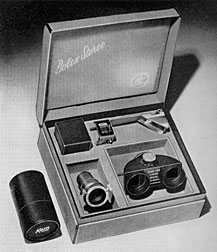 Stereo Kit
Stereo Kit
The Bolex Stereo Kit was introduced in 1952 as the first commercially available
system for stereo movies. Developed by Kern, the kit used a twin Yvar f/2.8
lens system attachment, exclusive to Bolex H cameras, to create three-dimensional
movies. The entire kit contained the following: instruction manual; stereo
lens attachment; offset bracket and mask for the viewfinder; Kern Paillard
f/1.6 stereo projection lens. Stereo viewing glasses and projection
screens were available separately.
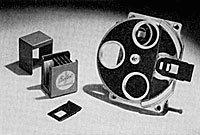 Bolex Filterslot Modification
Bolex Filterslot Modification
Pictured here is a gelatin filterslot modification from a 1952 catalog. The
filter slot was not yet standard on the H-16 until the introduction of the
Supreme in 1954. The modification
could be purchased for $30 from a franchised Bolex dealer, who, in turn, sent
the camera to a Bolex Service Center where the work was performed. A slot
was milled in to the fixed plate of the turret housing, in front of the film
aperture. The camera was then returned with five filter holders supplied in
a plastic lined metal box with the Paillard Bolex logo.
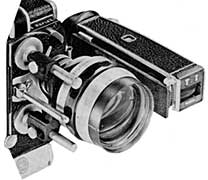 Anamorphot
Anamorphot
The Bolex Anamorphic Lens System was available by 1958. This accessory was
available for 8mm and 16mm cameras, and designed to film and project a wide
screen image. It was mounted to the front of the lens by means of a support
bracket. When used, the image filmed is a 2:1 aspect ratio, squeezed onto
the normal frame size (4:3 aspect ratio). The same accessory is later attached
in front of the projector lens, with a special bracket, resulting in a wide
"unsqueezed" image twice the width of its height.
 L-8 Ring Adaptor
L-8 Ring Adaptor
This was a D-mount lens mount adaptor for use with L8 cameras. The L8 cameras
used a non-standard lens mount. Although the thread diameter was similar to
a D-mount (5/8" or 15.8mm), the setting was different (0.3075" or 7.8mm).
The L8 Ring Adaptor (LUGOM) allowed normal d-mount lenses to be used by increasing
the setting to 0.484" (12.29mm). It was simply attached to the lens mount;
the desired d-mount lens was then screwed into the adaptor. Although they're
not rare, they seem to be difficult to find. It can be identified by the word
"L8" stamped on the side of the ring.
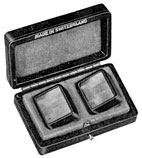 Parallax Corrector Prisms
Parallax Corrector Prisms
Later model L-8 cameras included a slot
to accept these prisms, which simply slid into place over the viewfinder.
These were intended to correct parallax error when framing close-ups with
the focus mount Yvar 12.5mm lens. Two prisms were included in a small felt
lined box, with 1' and 2' marked on each, for filming at distances of one
and two feet, respectively.
 Lens Extension Tubes
Lens Extension Tubes
These Paillard Bolex extension tubes were available for filming extreme close-ups
on the H-16. The tubes are c-mount only and came as a set of four: 5mm, 10mm,
20mm and 40mm.
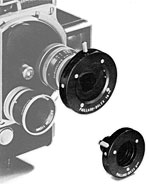
 Bolex Iris Vignetter
Bolex Iris Vignetter
A later model vignetter was intended for use with Kern lenses, and included
a lever for opening and closing the iris blades. This style is found in two
versions, marked 8mm for d-mount lenses, and 16mm for c-mount
lenses, and simply attaches to the front of the lens. Although Paillard Bolex
vignetters were available for Leica, Kern and other lenses since the 1940s,
the 16mm version for Kern lenses doesn't appear to have been advertised before
1959. An exaggerated illustration of a vignette on 16mm film is shown, at
right.